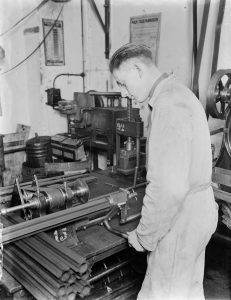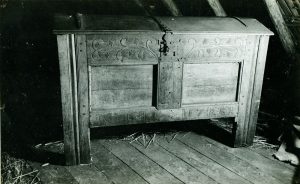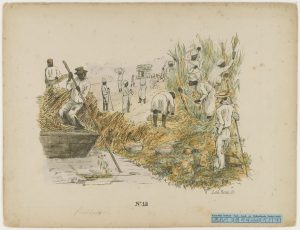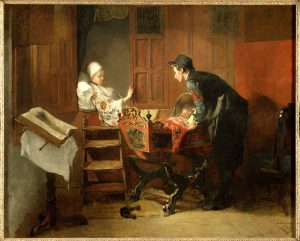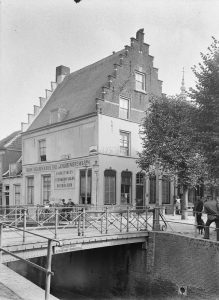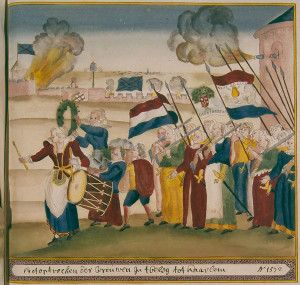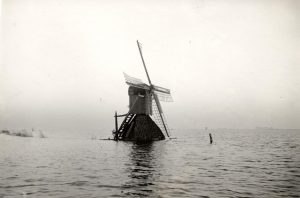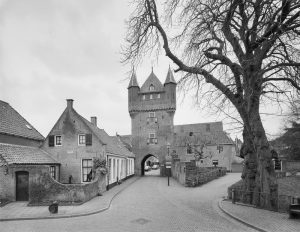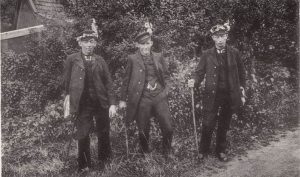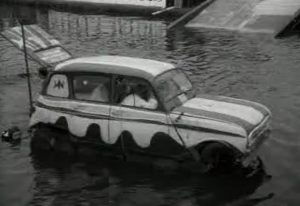An arbeider is a laborer. Sometimes, records will indicate the type of work they did, such as a boerenarbeider [farm laborer] or fabrieksarbeider [factory worker]. Most laborers were poor and did not own any real estate. Many were illiterate. … [Read more...]
Dutch term – Tuugkist
A tuugkist is a chest that is used to store personal belongings such as clothes or jewelry. It is a word that is used in the eastern provinces of the Netherlands. Many tuugkisten have elaborate carvings. Some of them even have the initials or a date. Tuugkisten were often made when a couple started their own household,, so it can even provide evidence about the time a marriage took place. … [Read more...]
Dutch term – Mulat, Mesties, Casties, Poesties, Testies
The Netherlands was involved in the slave trade from the late 1500s to the early 1800s. In the Dutch provinces, chattel slavery was outlawed, but it was common in the Dutch colonies such as Curacao and Suriname. In the colonies, slavery was abolished in 1863. In these Dutch colonies, specific terms were used to indicate the race of enslaved and freed people of color. These terms are offensive to our modern ears but understanding the meaning of these terms can be a vital clue to understanding … [Read more...]
Dutch term – Van Halven Bedde
Van halven bedde literally means "from half a bed." It is a term indicating half-siblings or half-aunts and -uncles. For example, if somebody refers to a woman as her "zuster van halven bedde" [sister from half a bed] this refers to a half-sister and a "oom van halven bedde" [uncle from half a bed] refers to a half-uncle. … [Read more...]
Dutch term – Kruidenier
A kruidenier is a grocery (the shop) or grocer (the occupation). The word kruiden means spices, and reminds of the colonial origins of the word, when people would go to the kruidenier to buy pepper and nutmeg from the East Indies. Since the 1960s, most kruideniers have been replaced by supermarkets. … [Read more...]
Dutch term – Vrouw
The word vrouw (plural: vrouwen) means woman. It can also mean wife. … [Read more...]
Dutch term – Overstroming
An overstroming is a flood or inundation. A large part of the Netherlands is below sea level, protected by dikes. If dikes aren't high enough or get oversaturated, the land protected by the dikes can flood. The last big flood was in 1953, when 1836 people died when large parts of Zeeland and Noord-Brabant flooded. … [Read more...]
Dutch term – Stadspoort
The stadspoort is the city gate. Until modern times, most cities had a wall around it, with gates protecting the entrance ways. Most towns had a portier or gatekeeper that was responsible for opening and closing the gates each day. … [Read more...]
Dutch term – Bruiloft
A bruiloft is a wedding. Different regions have different wedding traditions, and they also changed over time. The area of Twente in Overijssel, where I grew up, has some peculiar wedding traditions. Other regions have similar or slightly different traditions, but I thought I would share some that I experienced myself. Even in my generation (born in the 1970s), I knew a few girls who would start their trouseau as a teenager. They started asking for plates and linens from their twelfth … [Read more...]
Dutch term – Pieremagoggel
A pieremagoggel is a vessel, but not a boat since it cannot have a keel. The term is sometimes used to denote a ship that was no longer considered sea-worthy. Other pieremagoggels are built for fun, rather than any practical applications. Pieremagoggel contests score the vessels based on their creativity, and ingenuity of the propulsion mechanism, humor, and esthetics; with winners in different categories. It is not surprising that students of polytechnic schools often enter … [Read more...]
